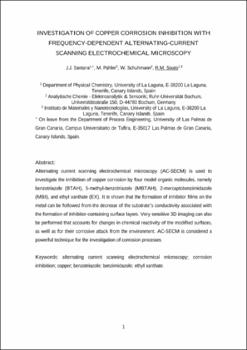Investigation of copper corrosion inhibition with frequency-dependent alternating-current scanning electrochemical microscopy
Fecha
2012Resumen
Alternating current scanning electrochemical microscopy (AC-SECM) is used to investigate the inhibition of copper corrosion by four model organic molecules, namely benzotriazole (BTAH), 5-methyl-benzotriazole (MBTAH), 2-mercaptobenzimidazole (MBI), and ethyl xanthate (EX). It is shown that the formation of inhibitor films on the metal can be followed from the decrease of the substrate’s conductivity associated with the formation of inhibitor-containing surface layers. Very sensitive 3D imaging can also be performed that accounts for changes in chemical reactivity of the modified surfaces, as well as for their corrosive attack from the environment. AC-SECM is considered a powerful technique for the investigation of corrosion processes






